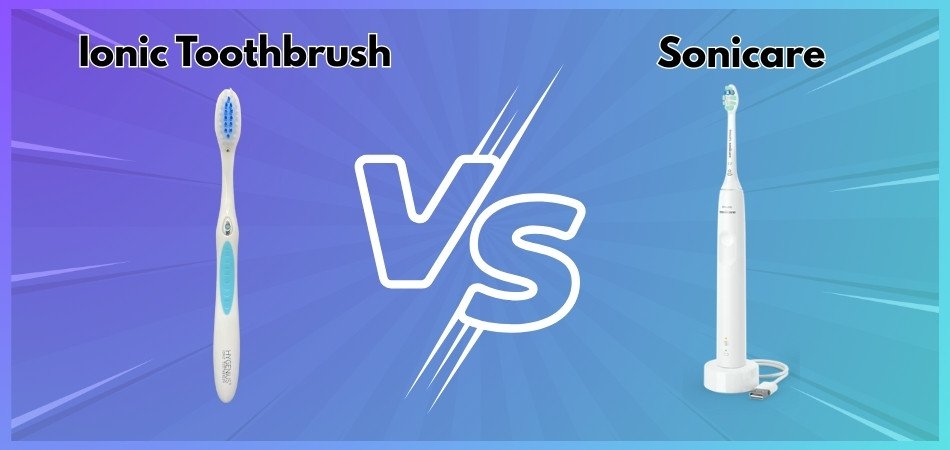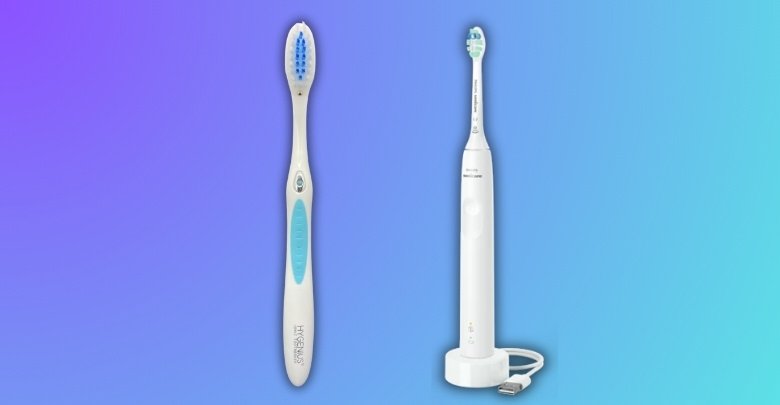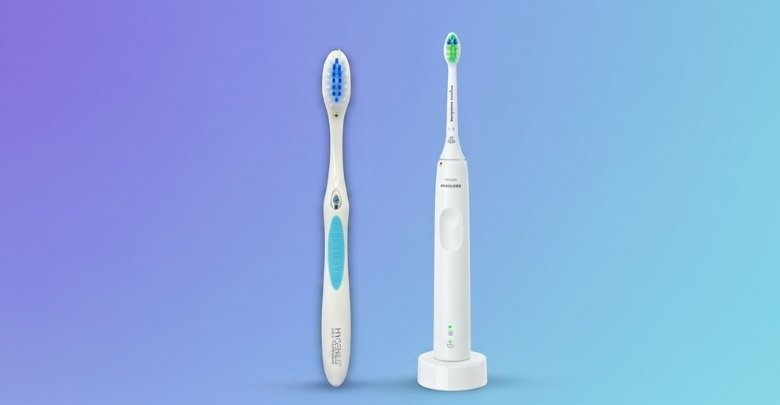A toothbrush is something everyone uses, yet the type you choose can make a big difference in your oral care routine. Some people are curious about the differences, and that’s where the topic of Ionic Toothbrush Vs. Sonicare comes in.
The main difference between an ionic toothbrush and Sonicare is the cleaning method. Ionic toothbrushes use negative ions to repel plaque from the tooth surface, while Sonicare uses high-speed vibrations to sweep plaque away. Ionic brushes feel like manual brushes with a charge effect, while Sonicare offers advanced features, deeper cleaning, and longer battery life.
Readers who want to learn more about how these two brushes compare in technology, comfort, features, and long-term value will find everything explained here. This article explores all the important details so you can understand which option fits your needs best.

Ionic Toothbrush Vs. Sonicare
Choosing between an ionic toothbrush and Sonicare often comes down to how each device works and what features matter most to you. Both offer unique cleaning styles and benefits. Let’s break it down clearly so you can decide better.
| Feature | Ionic Toothbrush | Sonicare (Sonic Toothbrush) |
| Cleaning Method | Uses positive ions to flip the charge of teeth, making plaque repel from the surface | Uses rapid vibrations (31,000+ strokes/min) to sweep away plaque and debris |
| Plaque Removal | Repels plaque by changing tooth polarity | Physically disrupts and removes plaque with high-frequency vibrations |
| Gum Health | Helps reduce buildup around gums by repelling particles | Improves gum health by pushing cleaning fluid between teeth and the gumline |
| User Comfort | Feels like manual brushing with added ion effect | Quieter, smoother transition for users shifting from manual brushing |
| Battery Life | Often shorter, requires more frequent charging | Longer-lasting battery, suitable for travel and daily use |
| Features | Usually simple, focused on ion-based cleaning | Often includes cleaning modes, timers, and smart tracking options |
| Transition Ease | Feels almost the same as a manual brush | Feels familiar but adds vibration for a more effective cleaning experience |
| Cost | Generally, more affordable, fewer extra features | Higher cost but offers advanced features and long battery performance |
| Effectiveness | Clinically effective, though slightly less proven in plaque removal | Clinically effective, sometimes showing slightly better results in studies |
Cleaning Method
Sonicare uses fast vibrations to sweep away food and plaque, while ionic toothbrushes work differently by changing the polarity of teeth to repel plaque. Each method is effective but relies on very different technology. Understanding this distinction is key to knowing which brush may suit your routine better.
Plaque Removal
Studies show both ionic toothbrushes and Sonicare are clinically effective at removing plaque. Sonicare has sometimes shown slightly better results, but the difference is small. Ionic brushes still perform well by repelling plaque instead of brushing it away. Both approaches improve oral health when used consistently.
Gum Health
Healthy gums are just as important as clean teeth, and both toothbrush types help improve gum condition. Sonicare improves gum health by pushing cleaning fluid around the gum line. Ionic brushes create a repelling effect that reduces buildup. Either one can support gum health with regular use.
User Comfort
Sonicare is often praised for being quieter, offering smoother brushing, and lasting longer on a single charge. Ionic toothbrushes feel more like a standard manual brush but add the ion effect. The choice depends on whether comfort or unique technology is more important to you.
Product Example
One popular option in the ionic category is the Hygenius Ionic Toothbrush. If you’re interested in how this product performs in real-life use, consider reading a Hygenius ionic toothbrush review to get a clearer idea of user experiences.
Battery Life
Sonicare typically lasts longer on a single charge compared to most ionic toothbrushes. This makes Sonicare more convenient for people who travel often or forget to charge their devices. Ionic brushes may need more frequent charging, but they still provide reliable cleaning power.
Transition Ease
Switching from manual brushing feels easier with Sonicare because it mimics brushing motions while adding vibration. Ionic brushes look and feel almost the same as a manual brush, which makes them simple for beginners. Both options are easy to adapt to without much effort.
Extra Features
Sonicare models often come with added features like cleaning modes, timers, or smart tracking. Ionic toothbrushes are generally simpler, focusing only on their ion-based cleaning system. The decision depends on whether you want advanced features or just a straightforward brush.
Cost Factor
Ionic toothbrushes usually cost less than Sonicare, but pricing can vary by brand and features. Sonicare’s advanced design and added modes often explain the higher price. Both remain good investments, depending on what matters more: technology or affordability.
Overall Choice
Both ionic toothbrushes and Sonicare brushes offer strong cleaning performance. Sonicare provides advanced features, long battery life, and a smoother transition, while ionic brushes give a unique technology at a simpler level. The better choice depends on your budget and brushing preferences.
Whether you choose Sonicare or an ionic toothbrush, both will help improve oral health. The decision should focus on comfort, budget, and features, ensuring that brushing feels easy, effective, and consistent for long-term dental care.
What Technology Does an Ionic Toothbrush Use Compared to Sonicare?
Toothbrush technology has advanced a lot, giving people more than just simple brushing options. Two popular types are ionic toothbrushes and Sonicare brushes, each using very different methods to clean teeth. To understand them better, let’s break things down step by step.

Ionic Cleaning
Ionic toothbrushes use a special ion transfer process to clean teeth. The handle generates a small negative charge that interacts with the teeth’s surface. This charge helps loosen the bond between plaque and enamel. As a result, the plaque becomes easier to brush away, even with gentle strokes.
Sonic Vibrations
Sonicare toothbrushes work with high-frequency vibrations instead of ion transfer. These vibrations move the bristles at very fast speeds, creating a strong brushing action. The rapid motion not only scrubs the tooth surface but also stirs up fluids in the mouth. This helps clean areas between teeth where bristles cannot always reach.
Cleaning Style
While both aim to remove plaque, the style of cleaning feels different. Ionic brushes focus on weakening plaque bonds with electricity, making brushing gentler. Sonicare brushes give a strong mechanical action, which may feel more powerful. The difference comes down to whether users prefer soft ion-based cleaning or fast vibration cleaning.
Safety Features
Ionic toothbrushes use a safe, low-level current that most people do not even feel. It is designed for daily use without risk. Sonicare brushes also remain safe, but their high-speed vibrations can feel intense for sensitive gums. Both options, however, are approved for everyday dental care.
User Experience
The choice often depends on personal comfort and results. Ionic toothbrush users enjoy a lighter brushing feel with smooth plaque removal. Sonicare users prefer the deep, vigorous clean that feels almost like a professional polish. Both technologies have their own loyal users, depending on brushing habits and gum sensitivity.
Ionic toothbrushes and Sonicare brushes both aim for cleaner teeth but use very different methods. Ionic brushes rely on gentle ion transfer, while Sonicare depends on powerful sonic vibrations. Choosing between them depends on whether you want a softer or stronger brushing experience.
What Do Dentists Say About Ionic Toothbrushes vs. Sonicare?
Dentists are often asked whether ionic toothbrushes or Sonicare brushes are better. Both options are designed to clean teeth well, but experts usually look at how they affect long-term oral health. Let’s explore what dental professionals usually say.
Effectiveness
Dentists generally agree that both ionic toothbrushes and Sonicare provide effective plaque removal. Sonicare often receives praise for its advanced vibration technology, which helps clean between teeth and along the gumline. Ionic brushes are also considered reliable but rely on a different cleaning method that shifts the charge of teeth to repel plaque.
Gum Health
Experts explain that both toothbrush types can support gum health when used correctly. Sonicare helps by pushing cleaning fluid below the gumline, reducing plaque buildup. Ionic brushes reduce surface buildup through polarity change. Regular and proper use of either toothbrush can reduce the risk of gum inflammation and maintain healthy tissues.
Safety Concerns
Dentists highlight the cleaning benefits but also warn that users should be aware of the possible side effects of ionic toothbrush use, such as gum irritation if used incorrectly. Sonicare is generally considered safe, though dentists still recommend gentle pressure to avoid enamel wear. Both brushes require proper technique to ensure safe daily use.
User Comfort
Many dentists point out that Sonicare offers a smoother brushing experience for those switching from manual brushes. Its quiet operation and longer battery life add comfort. Ionic brushes feel closer to manual brushing, which some users may prefer. Dentists often suggest trying both styles to see which feels more comfortable for consistent use.
Recommendations
Most dental experts recommend choosing a toothbrush based on personal comfort, features, and lifestyle needs. Sonicare may suit those who want more technology and battery life, while ionic brushes appeal to people who prefer a simple design. Dentists emphasize that whichever toothbrush you choose, consistency and proper brushing technique matter the most.
Dentists believe both Sonicare and ionic toothbrushes are safe and effective, but the right choice depends on user preference. The key message remains the same: consistent brushing with proper technique is what truly protects long-term dental health.
Which Toothbrush Is Easier to Maintain: Ionic or Sonicare?
People often compare toothbrushes by cleaning power, but upkeep is just as important. Maintenance includes battery life, replacement heads, and how easy it is to keep the brush clean. Let’s see how these two types compare.
Replacement Heads
With ionic toothbrushes, replacement heads are often unique and may not be as widely available. Sonicare, on the other hand, has many compatible options on the market. This makes Sonicare slightly easier to maintain, since getting new heads is rarely an issue.
Battery Charging
Ionic toothbrushes usually come with small batteries that can last quite a while before needing a replacement or recharge. Sonicare devices use rechargeable batteries with charging docks. Both are simple, but Sonicare requires users to remember to charge more often.
Cleaning Needs
Cleaning an ionic toothbrush is usually quick because the brush has fewer moving parts. Sonicare brushes, with their vibration technology, may need more regular rinsing to remove trapped toothpaste. Ease of upkeep is one of the biggest factors in choosing the best electric toothbrush, especially when comparing replacement heads and cleaning routines.
Long-term Costs
Ionic brushes may save money since they use fewer accessories, but replacement heads can sometimes be harder to find. Sonicare brushes have a steady supply of heads, though frequent changes add to costs. The difference depends on what feels more practical.
Overall Convenience
For users who prefer less upkeep, ionic brushes can be appealing due to their simpler design. For those who value availability and reliable parts, Sonicare may feel easier. Both offer practical solutions, but convenience depends on lifestyle and preferences.
Both ionic and Sonicare toothbrushes are designed to keep teeth clean, but their upkeep needs differ. Ionic brushes are simple to maintain, while Sonicare offers wider availability and support. Choosing between them depends on how much effort and cost you want in the long run.
Do Ionic Toothbrushes and Sonicare Both Require Toothpaste?
Many people get confused about whether ionic toothbrushes and Sonicare brushes need toothpaste. Some brands even say their ionic models can work without it. To clear this up, it helps to look at how each type is meant to be used.

Basic Cleaning
Sonicare toothbrushes are designed to always be used with toothpaste. The toothpaste not only helps remove plaque but also provides fluoride, which strengthens teeth. Ionic toothbrushes can claim to work without toothpaste, but many dentists still recommend using some for the added protection and freshness it gives.
Ionic Claims
Ionic brushes work by changing the charge on the teeth so plaque is repelled. Because of this, some makers say they can clean even without paste. However, toothpaste adds polishing and protective ingredients that the ionic action alone cannot provide. Using both together often gives better results.
Dentist View
Dental experts usually suggest that toothpaste should be used regardless of the toothbrush type. They point out that toothpaste provides benefits beyond cleaning, like fighting cavities and freshening breath. Even if ionic brushes can technically clean without it, most dentists say toothpaste is still important for full care.
User Preference
Some users enjoy the idea of brushing without toothpaste when using an ionic brush, especially for quick refresh sessions. Others feel brushing feels incomplete without paste. Sonicare users rarely skip toothpaste because its vibrations are designed to work best alongside it. Personal preference plays a big role here.
Best Practice
For the best oral care, dentists recommend combining the toothbrush with fluoride toothpaste. Sonicare works at its best this way, and ionic brushes also benefit. While ionic brushes can function without paste, using toothpaste ensures protection against cavities and fresher breath after each brushing.
Both ionic and Sonicare toothbrushes can help keep teeth clean, but toothpaste adds extra protection that neither brush can provide on its own. Using fluoride toothpaste with either option is generally the safest and most effective choice.
FAQs About Ionic Toothbrush Vs. Sonicare
Choosing between an ionic toothbrush and Sonicare can feel confusing, especially since both use very different cleaning methods. To make things easier, here are some common questions with simple answers. These will help you decide which option fits your needs.
Do Ionic Toothbrushes Work Without Vibration?
Yes, ionic toothbrushes work without vibration because they clean in a different way. They change the charge of your teeth, making plaque easier to remove. This means the brushing motion is gentle, more like a manual toothbrush. It feels less intense compared to a vibrating brush.
Can Sonicare Brushes Clean Without Toothpaste?
No, Sonicare brushes should always be used with toothpaste for the best results. The toothpaste adds fluoride and helps polish the teeth. Sonic vibrations alone can clean plaque, but won’t give the added cavity protection. Dentists always suggest combining both for full care.
Are Ionic Toothbrushes Safe for Sensitive Gums?
Ionic toothbrushes are often considered safe for sensitive gums because they use gentle cleaning. Instead of scrubbing hard, they rely on ion transfer. This process reduces gum irritation while still removing plaque. Many people with gum issues prefer the softer feel.
Does Sonicare Feel Too Strong for Beginners?
Some beginners find Sonicare vibrations strong at first, but most get used to them quickly. The movement can feel unusual compared to manual brushing. Many models also have gentler modes that ease the transition. Within days, the vibration often feels normal.
Do Ionic Toothbrushes Need Special Batteries?
Most ionic toothbrushes use replaceable or rechargeable batteries, depending on the brand. They don’t require anything unusual beyond standard batteries or chargers. The main difference is that they often need to be charged more often than Sonicare. Still, the upkeep is simple and not hard to manage.
Is Sonicare Better for Travel?
Sonicare is often preferred for travel because its batteries last longer. A single charge can last for weeks, depending on the model. Many come with travel cases for easy packing. This makes them convenient for people who move around often.
Are Ionic Toothbrush Heads Easy to Find?
Finding replacement heads for ionic toothbrushes can sometimes be harder than for Sonicare. Fewer stores carry them, so people may need to order online. Sonicare heads are widely available in stores and pharmacies. Availability often influences which brush feels easier to maintain.
Can Both Toothbrushes Improve Gum Health?
Yes, both ionic and Sonicare toothbrushes can improve gum health if used regularly. Sonicare pushes cleaning fluids around the gums with vibrations. Ionic brushes help by reducing plaque buildup through ion transfer. Either choice can support healthier gums over time.
Do Dentists Recommend One Over the Other?
Dentists generally support both toothbrush types as safe and effective. Sonicare often gets more attention because of strong clinical studies. Ionic brushes are newer but still show good results for many users. The main advice is to choose the brush you’ll use consistently.
Which Toothbrush Lasts Longer in Daily Use?
Sonicare toothbrushes tend to last longer on each charge and often feel sturdier. Ionic toothbrushes can be reliable too, but they sometimes require more frequent battery attention. Durability depends on brand and care. Both can last for years if handled properly.
Conclusion
Both toothbrush types are designed to clean effectively, but they do so in very different ways. Ionic brushes rely on polarity changes to repel plaque, while Sonicare uses high-frequency vibrations to physically disrupt it. In short, the answer to Ionic Toothbrush Vs. Sonicare is both clinically effective, with Sonicare sometimes showing slightly stronger results, while ionic brushes remain a simpler and more affordable option.
When deciding, think about features, comfort, and upkeep. Use toothpaste with either choice, brush gently to protect gums, and replace brush heads on time. By staying consistent, you’ll get the most from whichever toothbrush you use. Best wishes for your healthy smile.






